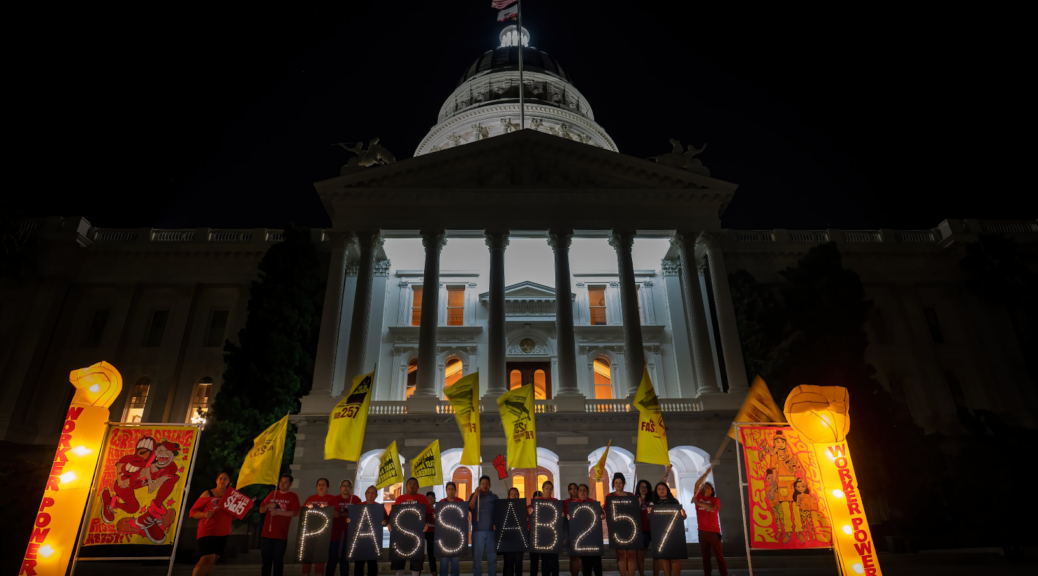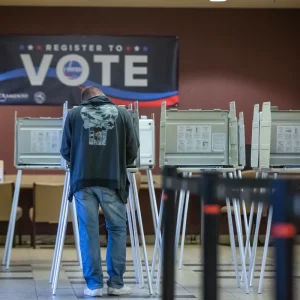On August 16, 2022, thousands of fast-food workers rallied across California in support of a bill that could change the future of employment in their industry. Their resounding calls for political action were the culmination of years of exploitation at the hands of massive corporations. Although the fast food industry is a major player in the California economy, the employees that generate its revenue are chronically underpaid, face rampant wage theft, labor violations, and workplace violence.
In 2021, the average fast food worker in California made just $15.61 per hour, far below the full-time hourly living wage for a single adult in the state, which was $21.24. These insufficient wages are exacerbated by the fact that the majority of fast food workers work part-time, although most of them would prefer to work more. On top of insufficient compensation, a recent survey found that 85% of California fast food workers in the sample had experienced some form of wage theft, including being forced to work overtime, receiving a subminimum wage, and not receiving or being compensated for breaks and sick leave. The pandemic only exacerbated concerns about workplace safety, and California fast-food workers have been found to be at higher risk for COVID-19 transmission. For California fast food workers, the majority of whom are women and people of color, the current $15 minimum wage and state labor standards are inadequate to ensure their protection and prosperity.
The poor conditions under which fast food workers operate are reinforced by their relative lack of bargaining power within the industry. Traditional methods of collective bargaining in the U.S., namely trade unions, don’t apply well to the fast food industry where franchises are prominent. About 73% of fast food employees nationwide work at franchised firms, and these agreements separate franchised employees from the corporations that employ them, making labor violations difficult to enforce. The fast food industry also has high turnover rates, estimated to be over 100% per year. This makes it difficult for workers to organize and affect long-term change within their workplaces. Franchised locations are hard to unionize individually because they are independently owned and operated, which means that it is nearly impossible to achieve large-scale union coverage. Because of all these factors, food service employees have one of the lowest unionization rates in the nation, and other institutions are needed to afford them the labor protections and wages they need to survive.
In 2021, California congresswoman Lorena Gonzales introduced the FAST Recovery Act to the State Assembly. The bill takes a different approach to fast food labor rights by creating a first-of-its-kind Fast Food Council composed of 10 fast food workers, franchisees, franchisors, and state health, safety, and labor officials with the power to set industry-wide minimum wage, safety standards, and enforce violations. The standards set would apply to any fast food chain with 100 or more locations nationwide, franchised or not. The bill had a tough path through the state legislature, passing both the State Senate and House with just the minimum number of votes before eventually being signed by Governor Newsom on Labor Day of 2022. The bill was controversial even among Democrats, and legislators had to make significant concessions in order to get it through. In the face of insurmountable odds, the passage of the FAST act was a massive victory for the Service Employees International Union and the activist group Fight for 15, who co-sponsored the bill, as well as the dozens of other organizations and politicians who endorsed it. Most importantly, it was celebrated by the many Californian fast food employees who campaigned for the bill and finally had a path towards a livable wage and safe workplaces.
Not everyone applauded the passage of the bill. For the past two years, a business coalition led by the International Franchise Association, fast food companies, and other corporate interest groups have attacked the bill from every angle, spending millions to prevent its passage. In addition to lobbying California legislators, the groups have launched a propaganda campaign to dissuade Californians from supporting the FAST Act under the tagline “Save Local Restaurants.” And their campaign has seen success. In January 2023, the anti-Labor coalition submitted a referendum with signatures of over a million California voters in opposition to the bill. The referendum has since been approved, meaning that the FAST Act is on hold for now. It is up to voters in 2024 to decide on the creation of a Fast Food Council.
The opposition campaign claims that a Fast Food Council and the prospective industry-wide minimum wage increase would raise operating costs for corporations, which would be passed onto consumers. This argument implies that fast food giants are struggling financially, but Subway and McDonald’s, two of the largest fast food chains in California, experienced a domestic same-store sales growth of 7.8% and 10.8% respectively in 2022. Given the amount of increased revenue that fast food corporations are experiencing, they could likely afford to compensate their employees a bit better. A 2022 analysis conducted by consulting firm Beacon Economics LLC under the name UC Riverside Center for Economic Forecasting & Development found that the FAST Act would result in a 20% increase in consumer prices for affected companies. This study was commissioned by the “Save Our Restaurants” group and has been subsequently removed from the internet. A projected price increase of this degree is unlikely, but even if consumer prices rise marginally, it may offset certain taxpayer costs. Currently, two-thirds of California fast-food workers or their families are enrolled in social safety net programs, at an average public cost of $4 billion a year. The FAST Act would lessen the dependence of fast food employees on welfare programs, freeing public funds to be diverted to other social services.
In addition to the effect on companies and consumers, the International Franchise Association claims that the bill would hurt franchisees, who often operate on slim margins and may be forced to sell their businesses due to higher operating costs. It’s true that the owners of franchised locations have to pay steep royalties to the corporations under which they operate, which push down their profits and incentive them to commit labor violations to stay in business. However, the FAST Act provides a solution to this by including franchisees on its boards, meaning that their interests will be represented when setting industry-wide standards. The FAST Act will go far to solve issues in the fast food industry like high turnover and retention, and protect franchisees and employees by ensuring standard compliance across the industry.
Opponents accuse the proposed Fast Food Council of being “radical,” and they aren’t entirely wrong. The council would practice sectoral bargaining, which is defined as “the establishment of legally binding labor standards across a sector in which workers and employers have formal institutional roles in the standards-setting process.” Current U.S. labor laws favor the kind of worksite-level bargaining that’s difficult to achieve in fast food. Sectoral bargaining has emerged as a promising solution for industries that are difficult to organize. In 2015, New York Governor Andrew Cuomo convened a Fast Food Wage Board that recommended and facilitated minimum wage increases for fast food workers across the state. Wage boards have applications to other industries as well. In 2018, Seattle created a Domestic Workers Standards Board to set minimum working standards for domestic workers in the city and legitimize the work that they do. California’s Fast Food Council takes it even further, having the purview to set standards related to a variety of working conditions beyond wages and strengthen systems of enforcement. It would be the first permanent joint wage and standard board with the power to set policy across California’s fast food chains without having to go through the state legislature.
Experiments with sectoral bargaining in the United States have been effective in raising standards for workers and increasing institutionalized worker power, in addition to increasing unionization rates in industries such as airport workers. In 2020, just 12.1% of workers in the U.S. were covered by some form of collective bargaining agreement, in comparison with upwards of 80% in countries like Austria, Sweden, and the Netherlands. That’s an alarming statistic, especially when we face income inequality and poverty rates among the highest of all OECD countries. Data shows that large-scale collective bargaining coverage like that exhibited by countries in northern and western Europe can only be achieved by employing strong systems of worksite and sectoral bargaining. Sectoral bargaining is by no means a perfect solution to the problems facing the American working class, but for workers in fissured industries like fast food employees, agricultural workers, domestic workers, and independent contractors, it may be the only way to catalyze the process of institutionalizing worker power.
Even though it was blocked from going into effect, the FAST Act has already inspired legislation to protect fast-food workers across the country. In Virginia, a bill has been introduced to create a Fast Food Industry Workers Standards Board focused on recommending policies to improve conditions for fast food workers. A bill proposed in New York would hold franchisors jointly liable for labor violations committed at their franchised locations. These bills are a sign that the demands for change from labor organizations and fast food workers are being heard by state legislatures, and fast food consumers need to respond as well. If Californians care about the people making their Big Macs and burritos, they’ll resist the corporate propaganda campaign and vote to empower fast food workers.
Featured Image Source: Fight for $15





Comments are closed.